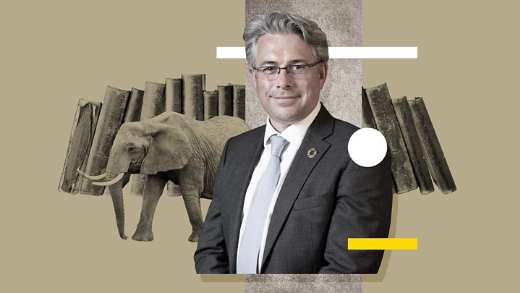Seeking to pair climate and financial advantage
We believe the risks and opportunities associated with climate change demand urgent action, as limiting its impacts is imperative not only for protecting the environment but also for ensuring long-term economic growth and stability. Addressing climate change by transitioning to a low-carbon economy can mitigate systematic risks, unlock new opportunities and create more resilient markets. Companies that effectively manage their impact on climate and adapt to these challenges are better positioned to thrive in this evolving landscape, presenting an opportunity to deliver sustainable value over the long term.
Our approach
We believe an active approach is crucial to generate alpha and identify the leaders and laggards in responding to climate change. First, we apply our firm-wide baseline exclusions policy and Paris-Aligned Benchmark (PAB) exclusions. We then establish a diverse investment universe of companies responding to climate change through our ‘Solutions’ and ‘Operations’ categories. Further fundamental and climate analysis then helps us with our aim to identify a portfolio of companies that have the potential to turn their strong environment efforts into positive financial outcomes. We continue to engage with portfolio companies to assess their progress towards our climate-related expectations.
Profitable growth
Our high-conviction, bottom-up approach is founded upon extensive fundamental research, robust climate measures and active risk management. This time-tested approach enables us to have confidence in achieving both financial and climate-related goals.
Greater diversification
The journey to a lower-carbon economy presents risks and opportunities across all sectors. By investing in companies evolving their operations to a lower-carbon world in addition to solutions providers, investors have the potential to benefit from an expanded opportunity set and greater portfolio diversification.
Bespoke engagement
Driving positive climate action through our bespoke engagement programme for companies to adopt science-based targets and provide Carbon Disclosure Project disclosures.
Global Climate Equity funds
Aviva Investors Global Climate Equity Fund (SICAV)
This fund invests in global companies where there is evidence that the companies are responding to climate change by: (1) orientating their business models to a lower carbon economy; and/or (2) providing solutions to mitigate climate change or help communities adapt to the adverse impacts of climate change.
Evidencing how we are progressing against our sustainable outcomes objective
This report looks at the progress the fund has made in 2023 in delivering tangible sustainable outcomes for clients, across the companies invested in as well as through company engagement and macro stewardship.


Aviva Investors Global Climate Equity: Strategy in brief
Pairing climate with financial advantage, this document highlights our approach to identifying companies that translate positive climate credentials to positive growth.
Key risks
Full information on risks applicable to the Fund are in the Prospectus and the Key Investor Information Document (KIID).
Investment risk & currency risk
The value of an investment and any income from it can go down as well as up and can fluctuate in response to changes in currency and exchange rates. Investors may not get back the original amount invested.
Equities risk
Equities can lose value rapidly, can remain at low prices indefinitely, and generally involve higher risks — especially market risk — than bonds or money market instruments. Bankruptcy or other financial restructuring can cause the issuer's equities to lose most or all of their value.
Counterparty risk
The Fund could lose money if an entity with which it does business becomes unwilling or is unable to meet its obligations to the Fund.
Emerging market risk
Investments can be made in emerging markets. These markets may be volatile and carry higher risk than developed markets.
Derivatives risk
Investments can be made in derivatives, which can be complex and highly volatile. Derivatives may not perform as expected, meaning significant losses may be incurred.
Specialist Fund Risk
Certain investments in the fund may be more susceptible to foreign government policies, including tax incentives and subsidies, as well as political support for certain environmental initiatives and developments. Under certain market conditions, the Fund may underperform funds that invest in a broader array of shares in global companies, for example, funds that do not provide any screening of companies undertaking fossil fuel activities.
Global Climate Equities team

Max Burns
Global Equities Portfolio Manager and Head of Equity Research
Need more information?
For further information, please contact our investment sales team.
Climate change views
-

Boosting low-carbon investment in the UK: 2025 Roadmap Update
11 Dec 2025
In 2024, we outlined our view on the most important public-policy interventions to unlock private investment in the low-carbon economy. In this update, we take stock of policy developments since, and look ahead to 2026 and beyond.
-

Navigating nature: Opportunities for the investor of tomorrow
10 Dec 2025
Our society, economies and financial systems are embedded in nature, not external to it. This paper sets out the actions we are taking to understand nature-related risks and opportunities to deliver outcomes that meet our clients’ needs, and to support nature-related global goals.
-

Decarbonising agriculture: Unlocking investment in sustainable land use
17 Jun 2025
Agriculture is integral to reaching net-zero emissions and reversing nature loss. Its transition also presents huge investment opportunities. We held a roundtable of experts to discuss challenges and solutions.
-

Climate Stewardship 2030 programme
29 Apr 2025
Designed to support our holistic stewardship approach, Aviva Investors adopted its Climate Stewardship 2030 programme (CS30) in 2024.
-

Decarbonising buildings: Five barriers and how to overcome them
28 Jan 2025
The built environment generates almost two-fifths of global emissions, but decarbonising the sector will require a coordinated effort. We brought together experts across the value chain to discuss shared challenges and solutions.
-

Can credit hold firm in 2025? The outlook for investment grade credit and climate transition
24 Jan 2025
Credit spreads remained largely immune to turbulence in 2024 despite concerns for a reacceleration in inflation, an unprecedented scale of global elections and volatility on economic data and changing rate cut expectations. Where to in 2025?
-

What’s next for nature? Key takeaways from Biodiversity COP16
11 Dec 2024
Following our participation at COP16, the 16th meeting of the Conference of the Parties to the UN Convention on Biological Diversity, we reflect on the key themes that emerged, outstanding challenges, and what this all means for investors.
-

Decarbonising transport: Five key challenges and how to overcome them
26 Nov 2024
Creating sustainable transport solutions is vital to meet net-zero pledges, but progress has been patchy. To encourage mobilisation across value chains, we brought together a range of sector experts to identify key blockers and potential solutions.
-

Building bridges to net zero: Mobilising value chains for decarbonisation
25 Nov 2024
From aviation to heavy industry, achieving net zero requires a collective unlocking of entire ecosystems. This is what our sector roundtables aim to do, by bringing together stakeholders from across the value chain of high-impact sectors.
-

The tipping point for climate finance: Making financial flows consistent with the Paris Agreement
29 Nov 2023
Transition plans, including from governments in response to the Global Stocktake, will be crucial to bring about the shift to a low-emissions, climate-resilient world. Markets need clear implementation signals to align capital with the goals of the Paris Agreement. Our in-depth report calls for the creation of a transition-plan ecosystem connecting all levels of the global economy.
-

Deals delayed and crowded trades…But investors can still find value in infrastructure debt
4 Sep 2023
Private infrastructure debt still offers a broad spectrum of opportunities, but investors face complex challenges. In this Q&A, our infrastructure debt team contemplate the current state of the market and where it goes from here.
-

Tipping points and transformation: Getting on the right side of change
16 Aug 2023
Rapid changes in the global economy could tip some sectors into low-carbon phases faster than incumbents expect, with important investment implications.
-

Charging up: Batteries and the fight against climate change
5 Jan 2023
Batteries are set to play a crucial role in helping to decarbonise the global transport and energy sectors. As capital floods into an industry experiencing exponential growth, we look at the key considerations for investors.
-

Confronting a permacrisis? The intersection between antimicrobial resistance, climate change and biodiversity loss
23 Nov 2022
Will a warmer and less biodiverse world give pathogens new opportunities, and do we have the tools to confront disease? This report discusses the complex intersection of three planetary crises and calls for urgent action to slow resistance to antimicrobial drugs – an obvious public health emergency.
-

The levers of change: A systems approach to reconcile finance with planetary boundaries
13 Sep 2022
Financial services underpin all economic activity, which itself depends on Earth’s natural capital. Resolving their interconnected issues to bring about a just transition will require a holistic, systems-thinking approach.
-

A tragedy of perception: Fixing the ESG blind spots in business, finance and economics
8 Sep 2022
A distorted sense of reality has caused us to disregard sustainability concerns when modelling economies, companies and finance. We can no longer ignore such material issues just because they are too hard to fathom. This is where systems thinking comes in, explains Steve Waygood.
Explore our equities range
Note for UK Investors: This Fund is domiciled in Luxembourg and is authorised by the Commission de Surveillance du Secteur Financier (CSSF). The Fund is recognised in the UK under the Overseas Funds Regime but is not a UK-authorised Fund and therefore is not subject to UK sustainable investment labelling disclosure requirements. UK investors should be aware that they can make a complaint about the fund, its management company, or its depositary. However, complaints may not be eligible for resolution by the UK’s Financial Ombudsman Service and any claims for losses related to the management company or depositary will not be covered by the Financial Services Compensation Scheme (FSCS). UK investors should consider seeking their own financial advice before making any decisions to invest and refer to the scheme prospectus for further information.




















